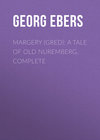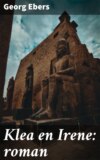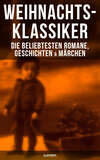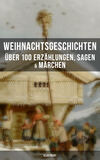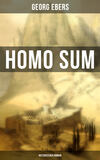Kitabı oku: «Margery (Gred): A Tale Of Old Nuremberg. Complete», sayfa 6
The man then read the future for each of us; my fortune was sheer folly, whereof no single word ever came true. He promised my brother a Count’s coronet and a wife from a race of princes; and when Ann heard it, and held up her finger at Herdegen for shame, he whispered in her ear that she was of the race of the Sovereign Queen of all queens—of Venus, ruler of the universe. All this she heard gladly; yet could no one persuade her to let her hand be read.
At last it was the woman’s turn to dance; before she began she had smoothed her hair and tied it with small gold pieces; and indeed she was a well grown maid and slender, well-favored in face and shape, with a right devilish flame in her black eyes. It was a strange but truly a pleasing thing to see her; first she laid a dozen of eggs in a circle on the grass, and then she beat her tambourine to the piping of the lad and the drumming of one of the men who had remained with her, and rattled it over her head with wanton lightness till the bells in the hoop rang out, while she turned and bent her supple body in a mad, swift whirl, bowing and rising again. Her falcon eyes never gazed at the ground, but were ever fixed upwards or on the bystanders, and nevertheless her slender bare feet never went nigh the eggs in the wildest spinning of her dance.
The gentlemen, and we likewise, clapped our hands; then, while she stayed to take breath, she snatched Herdegen’s hat from his head—and she had long had her eye on him—and gathered all the eggs into it with much bowing and bending to the measure of the music. When she had put all the eggs into the hat she offered it to my brother kneeling on one knee, and she touched the rim of her tambourine with her lips. The froward fellow put his fingers to his lips, as the little children do to blow a kiss, and when his eyes fell on that wench’s, meseemed that this was not the first time they had met.
It was now a warm and windless autumn day, and after dinner my aunt was carried out into the courtyard. When the dancing was at an end, she, as was her wont, questioned the men and the elder woman as to all she desired to know; and, learning from them that the men were likewise tinkers, she bid Ann hie to the kitchen and command that the house-keeper should bring together all broken pots and pans. But now, near by the wagon, was a noise heard of furious barking, and the pitiful cry of a child.
The Junker, who had set forth early in the day to scour the woods, had but now come home; the hounds with him had scented strangers, and had rushed on the brown babe, which was playing in the sand behind the wagon, making cakes and pasties. The dogs were indeed called off in all haste, but one of them, a spiteful badger-hound, had bitten deep into the little one’s shoulder.
I ran forthwith to the spot, and picked up the babe in my arms, seeing its red blood flow; but the elder woman rushed at me, beside her wits with rage, to snatch it from me; and whereas she was doubtless its mother or grand-dame, I might have yielded up the child, but that Ritter Franz came to me in haste to bid me, from my Aunt Jacoba, carry it to her.
Who better than she knew the whole art and secret of healing the wounds of a hound’s making? And so I told the old dame, to comfort her, albeit she struggled furiously to get the babe from me. Nay and she might have done so if the little thing had not clung round my neck with its right arm that had no hurt, as lovingly as though it had been mine own and no kin to the shrieking old woman.
But ere long a clear and strange light was cast on the matter; for when we had loosened the child’s little shirt, and my aunt had duly washed the blood from the wounds, under the dark hue of its skin behold it was tender white, and so it was plain that here was a stolen child, needing to be rescued.
Then the house-stewardess, the widow of a forester whose husband had been slain by poachers, and who labored bravely to bring up her five orphan children, with my aunt’s help—this woman, I say, now remembered that when she had made her pilgrimage, but lately, to Vierzehnheiligen, the Knight von Hirschhorn, treasurer to the Lord Bishop of Bamberg at Schesslitz, not far from the place of pilgrimage, had lost a babe, stolen away by vagabond knaves. Then Aunt Jacoba bethought herself that restitution and benevolence might be made one; and, quoth she, this matter might greatly profit the housekeeper and her little ones, inasmuch as that the sorrowing father had promised a ransom of thirty Hungarian ducats to him who should bring back his little daughter living; and forthwith the whole tribe of the bear-leaders were to be bound. The old beldame gave our men a hard job, for she tried to make off to the forest, and called aloud: “Hind—Hind!” which was the young wench’s name, with outlandish words which doubtless were to warn her to flee; but the serving men gained their end and made the wild hag fast.
Ann was pale and in pain with her head aching, but she helped my aunt to tend the child; and I was glad, inasmuch as I conceived that I knew where to find Herdegen and the young dancing wench, and I cared only to save his poor betrayed sweetheart from shame and sorrow. I crept away, unmarked, through the garden of herbs behind the lodge, to a moss but which my banished cousin had built up for me, in a covert spot between two mighty beech-trees, while I was yet but a school maid.
Verily my imagination was not belied, for whereas I passed round the pine-grove I heard my brother cry out: “Ah—wild cat!” and the hussy’s loathsome laugh. And thereupon they both came forth, only in the doorway he held her back to kiss her. At this she showed her white teeth, and meseemed she would fain bite him; she thrust him away and laughed as she said: “To-night; not too much at once.” Howbeit he snatched her to him, and thereupon I called him by name and went forward.
He let her go soon enough then, but he stamped with his foot for sheer rage. This, indeed, moved me not; with a calm demeanor I bid the wench follow me, and to that faithless knave I cried: “Fie!” in a tone of scorn which must have made his ears burn a good while. Before we entered the garden I bid him go round about the house and come upon the others from the right hand; she was to come with me and round by the left side.
I now saw that there were shreds of moss and dry leaves in the young woman’s hair and bid her brush them out. This she did with a mocking smile, and said in scorn: “Your lover?”
“Nay,” said I, “far from it. But yet one whom I would fain shield from evil.” She shrugged her shoulders; I only said: “Come on.”
As we went round to the front of the house the elder woman was being led away with her hands bound, and no sooner did the young one descry her than she picked up her skirts and with one wild rush tried to be off and away. I called Spond, my trusty guard, and bid him stay her; and the noble hound dogged her steps till the men could catch her and lead her to my aunt. The lady questioned her closely, deeming that so young and comely a creature might be less stubborn that the old hag who had grown grey in sins; but Hind stood dumb and made as though she knew not our language. As to Herdegen, he meanwhile had greeted Ann with great courtesy; nevertheless he had kept close to the dancing wench, and took upon himself to tie her bonds and lead her to the dungeon cell. He sped well, inasmuch as he got away with her alone, as he desired; for Sir Franz delayed me again, and such a suit as he now pleaded can but seldom have found a match, for I was bent only on following my brother, to rescue him from the vagabond woman’s snares; and while the knight held me fast by the hand, and swore he loved me, I was only striving to be free, and gazing after Herdegen and Hind, heeding him not. At length he hurt my hand, which I could not get away from him; and whereas he was beginning to look wildly and to seem crazed, I besought him to leave me free henceforth and try his fortune elsewhere. But still he would never have set me free so hastily if an evil star had not brought the Swabian Junker to the spot.
Sir Franz, without a word of greeting or warning, went up to him and upbraided him for having caused a mischief to a helpless babe through his heedless conduct. But if Sir Franz knew not already that he, to whom he spoke as roughly as though he were a froward serving man, was in truth son and heir of a right noble house, he learnt it now. His last words were: “And for the future have your savage hounds in better governance!” Whereupon the other coolly answered: “And you, your tongue.”
On this the other shrugged his shoulders and replied in scorn that to be sure his tongue was for use and not for silence like some folks’. And I marvelled where the Swabian, who was so slow of speech, found the words for retort and answer, till at length it was too much for him and he laid his hand on his hanger as a second and a sharper tongue.
CHAPTER VIII
The dancing-wench was locked into the cell with the rest of the wanderers, and as I looked in through the window at the fine young creature, squatting in a corner, I had pity on her, and for my part I would fain have sent her forth and away never to see her more.
I could nowhere find Herdegen; I had no mind for Uncle Christian’s jests; and when, at last, I betook me to my own chamber, meseemed that some horrible doom was in the air, from which there was no escape. And matters were no better when Ann, who of late had been free from her bad headache, came up to bed, to hide her increasing pain among the pillows. So I sat dumb and thoughtful by her side, till Aunt Jacoba sent for me to lay cold water on the arm of the little kidnapped maid. The child had been well washed, and lay clean and fresh between the sheets, and the swarthy dirty little changeling was now a sweet, fair-haired darling. I tended it gladly; all the more when I thought of the joy it would bring to its father and mother; notwithstanding the evil nightmare would not be cast off, not even when the clatter of wine cups and Uncle Christian’s big laugh fell on my ear.
Seldom had I so keenly missed Herdegen’s mirthful voice. The housekeeper told me that he had gone on horseback into the town at about the hour of Ave Maria. My grand-uncle had bidden him to go to him. The vagabond knaves had already been put to the torture in my brother’s presence, but they had confessed nothing of their guilt; inasmuch, indeed, as in our dungeon there were none other instruments of torture than the rack, the thumbscrew, and scourges needful for the Bamberg torture, and a Pomeranian cap, made to crush the head somewhat; but in Nuremberg there was a store, less mild and of more active effect.
The air was hot and heavy, the sun had set behind black clouds, yellow and dim, like a blind eye. A strange languor came over me, though I was wont to be so brisk, and with it a long train of dismal and hideous images. First I saw the Junker and Sir Franz, who had fallen out about me, a foolish maid; then it was my Ann, pining with grief, paler than ever with a nun’s veil on her; or standing by the Pegnitz, on the very spot where, erewhile, in the sweet Springtide, a forsaken maid had cast herself in.
The first lightning rent the sky and the storm came up in haste, bursting above our heads, and as the thunder roared closer and closer after the flash I was more and more frightened. Moreover the sick child wept piteously and waxed restless with fever and pain. By this time all was still in the dining-hall; but when my aunt bid me let the housekeeper take my place by the little one’s bed and go to my rest, I would not; for indeed I could in no wise have slept.
They let me have my way, and soon after midnight, seized with fresh dread anent Herdegen, I was at the open window to let the rough wind fan my hot head, when suddenly the hounds set up a furious barking, as though the Forest lodge were beset on all sides by robbers. And at the same time I saw, by the glare of the lightning, that the old lime-tree in the midst of my aunt’s herb garden was lying on the earth. This cut me to the heart, inasmuch as this tree was dear to my uncle, having been planted by his grandfather; and there was never a spot where his ailing wife was so fain to be in the hot summer days as under its shadow. Aye, and all my young life’s happiness, meseemed, was like that tree-torn up by the roots, and I gazed spellbound at the blasted lime-tree till I was affrighted by a new horror; on the furthest rim of the sky, on the side where the town lay, I beheld a line of light which waxed broader and brighter till it was rose and blood-red.
A wild uproar came up from the kennels and foresters’ huts, and I heard a medley of many voices; and whereas the distant flare began to soar more brightly heavenward I believed those who were saying below that all Nuremberg was in flames.
Even Aunt Jacoba had quitted her bed, and every soul under that roof looked forth at the fire and gave an opinion as to whether it were waxing or waning. And, thanks be to the Blessed Virgin, the latter were in the right; some few granaries, or stores of goods it might be, had been burnt out, and I, among other fainting hearts, was beginning to breathe more easily, when the watchman’s cry was heard once more and what next befell showed that my fears had not been groundless.
It was the vigil of Saint Simon and Saint Jude’s day—[October 28th]—in the year of our Lord 1420, and never shall I forget it. The great things which befell that night are they not written in the Chronicles of the town, and still fresh in many minds? but peradventure in none are they more deeply printed than in mine; and while I move my pen I can, as it were, see the great hall of the hunting lodge with my very eyes. Many folks are astir, and all in scant attire and full of eager thirst for tidings. The alarm of fire has brought them from their pillows in all haste, and they press close and gaze through the door, which stands wide open, at the light spot in the sky. Not one dares go forth in the wild wind, and many a one draws his garment or cloak or coverlet closer round him; the gale sweeps in with such fury that the pitch torches against the wall are well nigh blown out, and the red and yellow glare casts a weird light in the hall.
Then the watchman’s call is silent, and the growling and wailing of the forest folk comes nigher and nigher.
Presently a man totters across the threshold, upheld with sore difficulty by the gate-keeper Endres inasmuch as his own knees quake; and he who comes home thus, as he might be drunken or grievously hurt, is none other than my brother Herdegen. The torchlight falls on his face, and whereas my eyes descry him I cry aloud, and my soul has no thought of him but sheer pity and true love.
I haste to take Endres’ place while Eppelein, his faithful serving-man, whom he had not taken with him as is his wont, holds him up on the other hand.
But touch him where we may he feels a hurt; and while Uncle Conrad and the rest press him with questions, he can only point to his head and lips, which are too weak for thinking or speaking.
Alas! that poor fellow, meseems, bears but little likeness to my noble Herdegen, on whose arm the Italian Marchesa riveted her golden fetter. His face is swollen and bloodshot in one part, and cruelly torn in others. Where are the lovelocks that graced him so well? His left arm is helpless, his rich attire hangs about him in rags. He might be a battered, wretched beggar picked up in the high-road, and I rejoice truly to think that Ann is within the shelter of her bed and escapes the sight.
My aunt, who had long ere this been carried down to the hall, felt all his limbs and joints, and found that no bones were broken, while my uncle questioned him; and he told us in broken words that his horse had taken fright in the forest at a flash of lightning, had thrown him, and then dragged him through the brushwood; it was his man’s nag which, as it fell, he had taken out that evening, and it was roaming now about the woods.
He had scarce ended his tale, when one of the warders of the dungeon and the gate-keeper rushed in with the tidings that one of the prisoners, and that the young wench, had escaped, although the door of the keep was locked and the window barred. She was clearly a witch, and only one thing was possible; namely that she had flown through the barred window, after the manner of witches on a broomstick, or in the shape of a bird, a bat, or an owl; nay, this was as good as certain, inasmuch as that the watchman had seen a wraith in the woods at about the hour of midnight, and the same face had appeared to the kennel-keeper. Both swore they had crossed themselves thereat, and said many paternosters. The other captives bore witness to the same, declaring that the wench had never been one of them, but had joined herself unawares to their company last midsummer eve, without saying whence, or whither she would go. She had flown off some hours since in the form of a monstrous vampire, but had fallen upon them first with tooth and nail; and albeit they were an evil-disposed crew their tale seemed truthful, whereas they were covered with many scratches which were not caused by the torture.
At these tidings my brother lost all heart, and fell back in the arm-chair as pale as ashes. I was presently left alone with him; but he answered nothing to my questions, and meseemed he slept. As day dawned I was chilled with the cold, so, inasmuch I could do nothing to help him, I went down stairs. There I found our gentlemen taking leave, for one was off to the city to make inquisition as to the fire, and the other would fain seek his warm bed.
Hot elecampane wine had been served to give them comfort, when again we heard horses’ hoofs and the watchman’s call. Everybody came out in haste, only Uncle Christian Pfinzing did not move, for, so long as the wine jug was not empty, it would have needed more than this to stir him. He was a mighty fat man, with a short brick-red neck, cropped grey hair, and a round, well-favored countenance, with shrewd little eyes which stood out from his head.
We young Schoppers loved this jolly, warm-hearted uncle, who was childless, with all our hearts; but I clung to him most of all, since he was my dear godfather; likewise had he for many years shown an especial and truly fatherly care for Ann.
Well, Uncle Christian had peacefully gone on drinking the fiery liquor, waiting for the others; but when they came to tell him what tidings the horseman had brought, the cup fell from his hand, clattering down on the paved floor and spilling the wine; and at the same time his kind, faithful head dropped to one side, and for a few minutes his senses had left him. Albeit we were able ere long to bring him back to life again, I found, to my great distress, that his tongue seemed to have waxed heavy. Howbeit, by the help of the Blessed Virgin, he afterwards was so far recovered that when he sat over his cups his loud voice and deep laugh could be heard ringing through the room.
The tidings delivered by the messenger and which brought on this sickness—of which the leech Ulsenius had ere this warned him—might have shaken the heart of a sterner man; for my Uncle Christian lodged in the Imperial Fort as its warder, and his duty it was to guard it. Near it, likewise, on the same hill-crag, stood the old castle belonging to the High Constable, or Burgrave Friedrich. Now the Burgrave had come to high words with Duke Ludwig the Bearded, of Bayern-Ingolstadt, so that the Duke’s High Steward, the noble Christoph von Laymingen, who dwelt at Lauf, had made so bold, with his lord at his back, as to break the peace with Friedrich, although he had lately become a powerful prince as Elector of the Mark of Brandenburg.
The said Christoph von Laymingen, so the horsemen told us, had ridden forth to Nuremberg this dark night and had seized the castle—not indeed the Imperial castle, which stood unharmed, but the stronghold of the old Zollern family which had stood by its side—and bad burnt it to the ground. This, indeed, was no mighty offence in the eyes of the town-council, inasmuch as it bore no great friendship to his Lordship the Constable and Elector, and had had many quarrels with him-nay, long after this the council was able to gain possession of the land and ruins by purchases—till, uncle Christian bitterly rued having sent his men-at-arms, whose duty it was to defend the castle, out into the country, though it were for so good a purpose as fighting against the Hussites.
It might have brought him into bad favor with the Elector; however, it did him no further mischief. One thing was certainly proven beyond doubt: that knavish treason had been at work in this matter; at Nuremberg, under the torture, it came out that the bear-master had been a spy and tell-tale bribed by Laymingen to discover whither Pfinzing and his men had removed.
And lest any one should conceive that here was an end to the woes that had fallen on the forest lodge in that short time from midnight to daybreak, I must record one more; for the new day, which dawned with no hue of rose, grey and dismal over the tawny woods, brought us fresh sorrow and evil.
Behind the moss-hut, wherein I had found my Herdegen with the dancing hussy, the Swabian Junker and Ritter Franz had fought, without any heed of the law and order of such combat—fought for life or death, and for my sake. And as though in this cruel time I were doomed to go through all that should worst wound my poor heart, I must need go forth to see the stricken limetree at that very moment when the Junker had dealt his enemy a deadly stroke and came rushing away with his hair all abroad like a mad man. It was indeed a merciful chance that my Uncle Conrad and the chaplain likewise had come forth to the garden, so that I might go with them to see the wounded knight.
The youth was lying on the wet grass, now much paler than ever, and his lips trembling with pain. A faded leaf had fallen on his brow and was strange to behold against his ashen skin; but I bent me down and took it off. By him was lying the uprooted limetree, from which that leaf had fallen, and whereas the rain was dropping from it fast, meseemed it was weeping.
And my heart was knit as it never had been before, to this young knight who had shed his blood in my behalf; but while I gazed down right lovingly into his face the Swabian came close up to him with ruthful eyes, and from those of the wounded man there shot at me a glance so full of hate and malice that I shuddered before it. This was an end, then, to all pity and tenderness. And yet, as I looked on his cold, set face, as pale and white as dull chalk, I could not forbear tears; for it is ever pitiful to see when death overtakes one who is not ripe for dying, as we bewail the green corn which is smitten by the hail, and hold festival when the reaper cuts the golden ears.
Thus were there three sick and wounded in the forest-lodge, besides my aunt; for Uncle Christian must have some few days of rest and nursing. Howbeit there was no lack of us to tend them; Ann was recovered to-day and Cousin Maud had come in all haste so soon as she knew of what had befallen Herdegen; for, of us all, he held the largest room in her heart; and even when he was at school, albeit he had money and to spare of his own, she had given him so freely of hers that he was no whit behind the sons of wealthy Counts.
Biding the time till my cousin should come—and she could not until the evening—it was my part to stay with my brother; but whereas Ann would fain have helped me, this Aunt Jacoba conceived to be in no way fitting for a young maid; much less then would she grant my earnest desire that I might devote me to the care of Sir Franz; though she had it less in mind to consider its fitness, than to conceive that it would be of small benefit to the wounded man, at the height of his fever, to know that the maid for whose love he had vainly sued was at his side.
Thus I was forbidden to see Ann in my brother’s chamber; nevertheless I had much on my heart and I could guess that she likewise was eager to speak with me; but when at last I was alone with her in our bed chamber, she had matter for speech of which I had not dreamed. When I asked her what message she might desire me to give Herdegen from her, she besought me as I loved her not to name her at all in his presence. This, indeed, amazed me not a little, inasmuch as I weened not that she knew of all the grief I had suffered yestereve. But this was not so; I learnt now that she had marked everything, and had heard the men’s light talk about the dashing youth whom the dark-eyed hussy had been so swift to choose from among them all. I, indeed, tried to make the best of the matter, but she gave me to understand that, if her lover had not done himself a mischief, it had been her intent to question him that very day as to whether he was in earnest with his love-pledges, or would rather that she should give him back his ring and his word. All this she spoke without a tear or a sigh, with steadfast purpose; and already I began, for my part, to doubt of the truth of her love; and I told her this plainly. Thereupon she clasped me to her, and while the tears gathered and sparkled in her great eyes, expounded to me all the matter; and in truth it was all I should myself have said in her place. She, of simple birth, would enter the circle of her betters on sufferance, and her new friends would, of a certainty, not do her more honor than her own husband. On his manner of treating her therefore would depend what measure of respect she might look for as his wife. And so long as their promise to marry was a secret, she would have him show, whether to her alone or before all the world, that he held her consent as of no less worth than that of the wealthiest and highest born heiress.
All this she spoke in hot haste while her cheeks glowed red. I saw the blue veins swell on her pure brow, and can never forget the image of her as she raised her tearful eyes to Heaven and pressing her hands on her panting bosom cried: “To go forth with him to want or death is as nothing! But never will I be led into shame, not even by him.”
When presently I left her, after speaking many loving words to her, and holding her long in my arms, she was ready to forgive him; but she held to this: “Not a word, not a glance, not a kiss, until Herdegen had vowed that yesterday’s offence should be the first and last she should ever suffer.”
How clearly she had apprehended the matter!
Albeit she little knew how deeply her beloved had sinned against the truth he owed her. They say that Love is blind, and so he may be at first. But when once his trust is shaken the bandage falls, and the purblind boy is turned into a many-eyed, sharp-sighted Argus.
